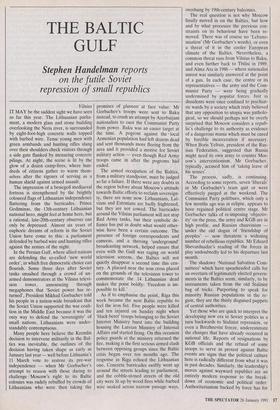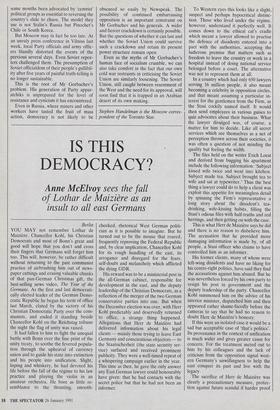THE BALTIC GULF
Stephen Handelman reports
on the futile Soviet repression of small republics
Vilnius IT MAY be the saddest sight we have seen so far this year. The Lithuanian parlia- ment, a modern glass and stone building overlooking the Neris river, is surrounded by eight-foot-high concrete walls topped with barbed wire. Tense young men with green armbands and hunting rifles slung over their shoulders check visitors through a side gate flanked by menacing concrete pilings. At night, the scene is lit by the glow of a dozen camp-fires, where hun- dreds of citizens gather to warm them- selves after the rigours of serving as a human shield against armed assault.
The impression of a besieged mediaeval fortress is strengthened by the brightly coloured flags of Lithuanian independence fluttering from the barricades. Prince Gediminas, the 13th-century Lithuanian national hero, might feel at home here, but a rational, late-20th-century observer can only be depressed. Almost six years of euphoric dreams of reform in the Soviet Union have come to this: a parliament defended by barbed wire and hunting rifles against the armies of the night.
In the Persian Gulf, where allied nations are defending the so-called 'new world order', in which free democratic choice can flourish. Some three days after Soviet tanks smashed through a crowd of un- armed demonstrators at the Vilnius televi- sion tower, announcing through megaphones that 'Soviet power has re- turned', President Mikhail Gorbachev told his people in a nation-wide broadcast that the Soviet Union supported the war coali- tion in the Middle East because it was the only way to defend the 'sovereignty' of small nations. Lithuanians were under- standably contemptuous.
Many people here believe the Kremlin decision to intervene militarily in the Bal- tics was inevitable, the outlines of the decision having taken shape as early as January last year—well before Lithuania's 11 March vote to restore its pre-war independence — when Mr Gorbachev's attempt to reason with those daring to challenge /Moscow's right to its Baltic colonies was rudely rebuffed by crowds of Lithuanians who were then taking the
promises of glasnost at face value. Mr Gorbachev's troops were sent to Baku instead, to crush an attempt by Azerbaijani nationalists to oust the Communist Party from power. Baku was an easier target at the time. A pogrom against the • local Armenian population had left dozens dead and sent thousands more fleeing from the area and it provided a motive for Soviet military action — even though Red Army troops came in after the pogroms had ended.
The armed occupation of the Baltics, from a military standpoint, must be judged so far a failure. If there were any doubts in the region before about Moscow's attitude towards Baltic efforts to reclaim sovereign- ty, there are none now. Lithuanians, Lat- vians and Estonians are badly frightened, but they are not cowed. The barricades around the Vilnius parliament will not stop Red Army tanks, but their symbolic de- fiance has put in doubt what would other- wise have been a certain outcome. The presence of foreign correspondents and cameras, and a thriving 'underground' broadcasting network, helped ensure that even with the Gulf war raging on world television screens, the Baltics will not quietly disappear a second time this cen- tury. A placard near the iron cross placed on the grounds of the television tower to commemorate the 14 Lithuanian dead makes the point boldly: 'Freedom is im- possible to kill.'
As if to emphasise the point, Riga this week became the next Baltic republic to feel the iron fist. Five people were killed and ten injured on Sunday night when `black beret' troops belonging to the Soviet Interior Ministry burst into the building housing the Latvian Ministry of Internal Affairs and started firing. On this occasion police guards at the ministry returned the fire, making it the first serious armed clash between opposing groups since the Baltic crisis began over ten months ago. The response in Riga echoed the Lithuanian one. Concrete barricades swiftly went up around the streets leading to parliament, and the cobble-stoned streets of the old city were lit up by wood fires while barbed wire snaked across narrow passage ways, overhung by 19th-century balconies.
The real question is not why Moscow finally moved in on the Baltics, but how and by what processes the previous con- straints on its behaviour have been re- moved. There was of course no `Lebano- nisation' (Mr Gorbachev's words), or even a threat of it in the cooler European climate of the Baltics. Nevertheless, a common threat runs from Vilnius to Baku, and even further back to Tbilisi in 1989, and Alma Ata in 1986 — where nationalist unrest was similarly answered at the point of a gun. In each case, the centre or its representatives — the army and the Com- munist Party — were being gradually undermined by popular forces. Just as dissidents were once confined to psychiat- ric wards by a society which truly believed that any opposition to utopia was patholo- gical, so we should perhaps not be overly surprised that Moscow considers a repub- lic's challenge to its authority as evidence of a dangerous mania which must be cured by forcible incarceration if necessary. When Boris Yeltsin, president of the Rus- sian Federation, suggested that Russia might need its own army to counter Mos- cow's interventionism, Mr Gorbachev, typically, accused him of 'taking leave of his senses'.
The process, sadly, is continuing. According to some reports, seven 'liberals' in Mr Gorbachev's team quit or were effectively purged at the weekend. The Communist Party politburo, which only a few months ago was in eclipse, appears to have regained political centre stage. Mr Gorbachev talks of re-imposing 'objectiv- ity' on the press, the army and KGB are in high profile, and Russian chauvinism under the old slogan of 'friendship of peoples' — now threatens a widening number of rebellious republics. Mr Eduard Shevardnadze's reading of the forces in play undoubtedly led to his departure last month.
The shadowy 'National Salvation Com- mittees' which have spearheaded calls for an overturn of legitimately elected govern- ments in the Baltics seem, similarly, to be instruments taken from the old Stalinist bag of tricks. Purporting to speak for minority Russian populations in the re- gion, they are the thinly disguised puppets of central authorities.
Yet those who are quick to interpret the developing new era in Soviet politics as a turn backwards to Stalinist repression, or even a Brezhnevist freeze, underestimate the changes that have already occurred in national life. Reports of resignations by KGB officials and the refusal of some troops to serve in protest against Baltic events are signs that the political culture here is radically different from what it was in past decades. Similarly, the leadership's moves against wayward republics are an entirely modern response to the break- down of economic and political order. Authoritarianism backed by force has for some months been advocated by 'centrist' political groups as essential to reversing the country's slide to chaos. The model they use is not Stalin's Russia but Pinochet's Chile or South Korea.
But Moscow may in fact be too late. At an unruly press conference in Vilnius last week, local Party officials and army offic- ers blandly distorted the events of the previous several days. Even Soviet repor- ters challenged them. The presumption of Soviet officialdom of their people's gullibil- ity after five years of painful truth-telling is no longer sustainable.
This is the root of Mr Gorbachev's problem. His generation of Party appar- atchiks is unprepared for the level of resistance and cynicism it has encountered.
Even in Russia, where miners and other workers have tasted the fruit of mass action, democracy is not likely to be obscured so easily by Newspeak. The possibility of continued embarrassing opposition is an important constraint on Mr Gorbachev and his generals. A wider and fiercer crackdown is certainly possible. But the questions of whether it can last and whether the Soviet Union could survive such a crackdown and retain its present power structure remain open.
Even as the myths of Mr Gorbachev's human face of socialism crumble, we can also take comfort in the fact that our own cold war restraints in criticising the Soviet Union are similarly loosening. The Soviet Union, still caught between resentment of the West and the need for its approval, will soon find that it is trapped in an Arabian desert of its own making.
Stephen Handelman is the Moscow corres- pondent of the Toronto Star.



























































 Previous page
Previous page